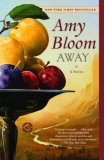Summary | Excerpt | Reading Guide | Reviews | Beyond the Book | Readalikes | Genres & Themes | Author Bio

A Novel
by Amy Bloom
They had room, Cousin Frieda’s letter had said, for family or dear friends. They had a little sewing business and could provide employment while people got on their feet. It was a great country, she wrote. Anyone could buy anything—you didn’t have to be gentry. There was a list of things Frieda had bought recently: a sewing machine (on installment but she had it already), white flour in paper sacks, condensed milk, sweet as cream and didn’t go bad, Nestlé’s powdered cocoa for a treat in the evening, hairpins that matched her hair color exactly, very good stockings, only ten cents. They had things here that people in Turov couldn’t even imagine.
Lillian had walked through the last door, marked push to new york, and showed her letter to a man moving luggage onto the ferry. He smiled and shrugged. She held up the letter and the block-printed address a dozen times to faces that were blank, or worse than blank, knowing and dubious; she held it up, without much hope, to people who could not themselves read and pushed her aside as if she’d insulted them. She hadn’t imagined that in front of her new home, in her new country—after the trolley cars and the men with signs on their fronts and their backs, the women in short skirts, the colored boys with chairs on their backs and pictures of shiny shoes around their necks, and a team, an old man in red pants working with a young girl with a red hat, selling shoelaces, fans, pencils, and salted twists of dough, which smelled so good, Lillian had to cover her mouth and swallow hard—the first thing she would see when she finally got to Great Jones Street was a woman in her nightgown and a man’s overcoat, weeping. Lillian watched the woman open a folding chair and take a china plate from her pocket and hold it on her lap. People passed by and put a few coins in the plate.
Cousin Frieda had run down the stairs and hugged Lillian. “Dear little Lillian,” she said. “My home is your home.” Frieda was thirty. Lillian remembered her from a family wedding when Frieda took her into the woods and they picked wild raspberries until it was dark. Lillian watched the woman across the street, sitting stock-still in the chair, tears flowing down her face onto her large, loose breasts, dripping onto the plate with the coins.
“Eviction,” Frieda said. “You can’t pay, you can’t stay.” She said in Yiddish, “Es iz shver tzu makhen a leben.” It’s hard to make a living.
She wanted to make sure Lillian understood. She didn’t want Lillian to be frightened, she said, everything would work out fine between them, but Lillian should see, right away, how it’s nothing to go from having a home, which Lillian does now, with her cousin Frieda, to having no home at all, like the woman over there who was thrown out this morning. Lillian did see.
Frieda took Lillian by the hand and crossed the street. She put a penny in the plate and said, “I’m sorry, Mrs. Lipkin.” Taking Lillian up the stairs to her apartment, Frieda said to Lillian, “Poor thing,” and she gestured over her shoulder to a small room filled with a bed and two wooden crates. “You share with Judith.”
The lesson of Mrs. Lipkin was not lost on Lillian, still holding everything she had in Yitzak Nirenberg’s leather satchel.
It’s always the same dream. She’s dead. She’s blind, too. All she can see is a bursting red inside her eyelids, as if she’s on her back in Turov’s farthest field on the brightest day in June, closing her eyes to the midday sun. The entire world, the trees, the birds, the chimneys, has disappeared; there’s nothing but a gently falling white sky, which becomes her bedsheet. A straw pokes through to her cheek and she brushes it away and feels dried blood on her face. She rubs her eyes and feels the strings of blood that were closing her lids. They roll down her cheeks and into her mouth, solid bits of blood, hard as peppercorns, softening on her tongue, and she spits them into her hand and her hands turn red.
Excerpted from Away by Amy Bloom Copyright © 2007 by Amy Bloom. Excerpted by permission of Random House, a division of Random House, Inc. All rights reserved. No part of this excerpt may be reproduced or reprinted without permission in writing from the publisher.




The whole problem with the world is that fools and fanatics are always so certain of themselves, and wiser people ...
Click Here to find out who said this, as well as discovering other famous literary quotes!
Your guide toexceptional books
BookBrowse seeks out and recommends the best in contemporary fiction and nonfiction—books that not only engage and entertain but also deepen our understanding of ourselves and the world around us.